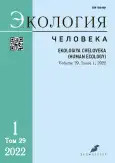Самооценка состояния здоровья и его взаимосвязь с психологическими и социокультурными ценностями у пожилых жителей города Петрозаводска
- Авторы: Хяникяйнен И.В.1, Буркин М.М.1, Молчанова Е.В.2, Кручек М.М.1
-
Учреждения:
- Петрозаводский государственный университет
- Институт экономики Карельского научного центра РАН
- Выпуск: Том 29, № 1 (2022)
- Страницы: 37-46
- Раздел: Статьи
- URL: https://journal-vniispk.ru/1728-0869/article/view/83315
- DOI: https://doi.org/10.17816/humeco83315
- ID: 83315
Цитировать
Полный текст
Аннотация
Цель. Анализ взаимосвязи самооценки состояния здоровья пожилыми (по классификации ВОЗ) жителями города с их личностными и социокультурными ценностями.
Материал и методы. Изучены психологические особенности, досуговая активность, субъективная оценка состояния своего здоровья посредством социологического анкетирования. В опросе участвовали 411 жителей г. Петрозаводска в возрасте от 61 до 75 лет, в том числе 134 мужчины (32,6%) и 277 женщин (67,4%). Средний возраст респондентов составил 64,43±6,57 года.
Результаты. Выявлено, что пожилые горожане обладают преимущественно интернальными личностными характеристиками: ответственностью (48,42%), исполнительностью (41,36%) и аккуратностью (35,04% респондентов). При этом ответственность (р=0,021) и аккуратность (р=0,017) значимо доминируют у женщин, а смелость (р=0,001), целеустремленность (р=0,002) и эффективность в делах (р=0,043) – у мужчин. Приоритетными способами организации свободного времени респондентов являются пассивные формы: общение с друзьями и родственниками (24,09%), просмотр телепередач (20,68%), чтение (17,76% респондентов). Гендерная специфика определяется только в таких позициях, как «посещение выставок и театрально-концертных постановок» (р=0,044), «чтение» (р=0,008), «общение» (р=0,041) с преобладанием частоты этих позиций у женщин. Причём удовлетворительная субъективная оценка состояния здоровья у опрошенных коррелирует с их социокультурными ценностями, но не ассоциирована с их психологическими ценностями.
Заключение. У пожилых лиц города Петрозаводска удовлетворительная субъективная оценка состояния здоровья имеет высоко значимую (р <0,001) положительную корреляцию с социокультурными ценностями при отсутствии статистически значимой взаимосвязи с их психологическими характеристиками. Ведущими психологическими характеристиками пожилых жителей г. Петрозаводска являются ответственность, исполнительность и аккуратность. При этом ответственность и аккуратность преобладают у женщин, а смелость, целеустремленность и эффективность в делах — у мужчин. Наиболее частыми формами организации свободного времени лиц старших возрастных групп выступают живое общение, просмотр телепередач, чтение. Гендерная специфика прослеживается лишь в позициях «посещение выставок и театрально-концертных постановок», «чтение», «живое общение» с преобладанием этих предпочтений у женщин. Обнаруженные «тренды» личностных свойств и социокультурных характеристик, ассоциированные с состоянием здоровья лиц пожилого возраста, могут быть востребованы для построения популяционных стратегий медико-психологической и социальной реабилитации среди данной возрастной когорты населения, направленных на профилактику заболеваний и повышение качества жизни в рамках концепции «успешного старения».м
Полный текст
Открыть статью на сайте журналаОб авторах
Игорь Викторович Хяникяйнен
Петрозаводский государственный университет
Email: hanikainen@yandex.ru
ORCID iD: 0000-0002-2655-5480
SPIN-код: 2569-7350
доктор медицинских наук, профессор
Россия, ПетрозаводскМарк Михайлович Буркин
Петрозаводский государственный университет
Email: burkin@onego.ru
SPIN-код: 5433-2250
доктор медицинских наук
Россия, ПетрозаводскЕкатерина Владимировна Молчанова
Институт экономики Карельского научного центра РАН
Email: molch@yandex.ru
ORCID iD: 0000-0003-4717-5708
SPIN-код: 6825-4680
доктор экономических наук, кандидат технических наук
Россия, ПетрозаводскМарина Марленовна Кручек
Петрозаводский государственный университет
Автор, ответственный за переписку.
Email: kruchek@petsu.ru
ORCID iD: 0000-0003-0405-7365
SPIN-код: 4403-0795
кандидат физико-технических наук, доцент
Россия, ПетрозаводскСписок литературы
- Kulik T., Janiszewska M., Piróg E., et al. Health situation of the elderly in Poland and other European countries // Med Og Nauk Zdr. 2011. Vol. 17, N 2. P. 90–95.
- Голубева Е.Ю., Данилова Р.И., Соловьев А.Г. Социально-экологические подходы в оценке потребности в уходе за пожилыми людьми // Экология человека. 2005. № 9. С. 48–53.
- Новикова И.А., Соловьев А.Г., Сидоров П.И. Психологические особенности больных с сердечно-сосудистой патологией // Российский кардиологический журнал. 2004. № 1. С. 28–32.
- Галиулина О.В., Лапик С.В., Набойченко Е.С., и др. Актуальные аспекты организации медико-социального сопровождения лиц пожилого и старческого возраста с множественными хроническими заболеваниями // Академический журнал Западной Сибири. 2019. Т. 15, № 4. С. 57–59.
- Хяникяйнен И.В., Буркин М.М., Молчанова Е.В., Кручек М.М. Социальная фрустрированность и субъективная оценка состояния здоровья пожилых горожан Республики Карелия // Экология человека. 2020. № 9. С. 36–43. doi: 10.33396/1728-0869-2020-9-36-43
- Буркин М.М., Молчанова Е.В., Хяникяйнен И.В., и др. Скрининг геронтопсихологических показателей для улучшения психической адаптации у жителей Республики Карелия // Вестник неврологии, психиатрии и нейрохирургии. 2019. № 11. С. 70–77. doi: 10.33920/med-01-1910-10
- Валиева А.Б., Токатлыгиль Ю.С. Особенности переживания старости мужчинами и женщинами пожилого возраста // Вестник Курганского государственного университета. 2018. № 3. С. 30–33.
- Антонен Е.Г., Хяникяйнен И.В. Реабилитация пациентов с хронической ишемией мозга с позиций биопсихосоциального подхода // Журнал неврологии и психиатрии имени С.С. Корсакова. 2014. Т. 114, № 8. С. 316.
- Холодцева Е.Л., Портнова А.Г. Детерминанты личностной зрелости в позднем возрасте // Вестник Кемеровского государственного университета. 2016. № 2. С. 140–145.
- Воробьева А.Е., Акбарова А.А. Социально-психологические типы досуговой активности пожилых людей (на примере жителей Московского региона) // Вестник Тверского государственного университета. Педагогика и психология. 2019. № 1. С. 89–99.
- Гузова А.В., Голубева Е.Ю., Соловьев А.Г. Особенности качества жизни и биологического возраста пожилых лиц с алкогольной зависимостью в условиях Европейского Севера // Успехи геронтологии. 2010. Т. 23, № 1. С. 110–114.
- Щанина Е.В. Организация досуга пожилых людей // Известия высших учебных заведений. Поволжский регион. Общественные науки. 2013. № 4. С. 149–157.
- Беловол Е.В., Бойко З.В., Радыш И.В., и др. Здоровье лиц «третьего возраста»: объективное и субъективное в представлениях пожилых людей о своем здоровье // Экология человека. 2016. № 4. С. 45–49. doi: 10.33396/1728-0869-2016-4-45-49
- Кумелина М.Н. Организация досуга как один из факторов адаптации пожилых людей к проживанию в стационаре // Вестник социально-политических наук. 2020. № 19. С. 11–14.
Дополнительные файлы








